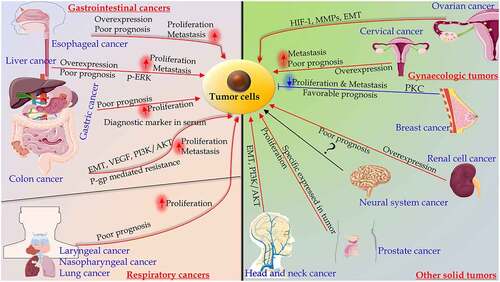Figures & data
Figure 1. The significance of Stanniocalcin 2 in malignancies and mechanisms. Among gastrointestinal cancers, STC2 is overexpressed in esophageal, liver, gastric and colon cancers, which is associated with poor prognosis, proliferation and metastasis. In gynecologic cancers, such as ovarian cancer, STC2 plays an important role in migration and invasion, which is regulated by distinct signaling pathways. The overexpression of STC2 in cervical cancer was correlated with the poor prognosis. In breast cancer, the overexpression of STC2 partially inhibited EMT by protein kinase C (PKC)/Claudin-1-mediated signaling pathway. In respiratory cancers, including laryngeal, nasopharyngeal, and lung cancers, the overexpression of STC2 predicts poor prognosis, and improves proliferation. The levels of STC2 mRNA and protein are increased in renal cell carcinoma. STC2 is overexpressed in castration-resistant prostate cancer. The overexpression of STC2 may promote head and neck squamous cell carcinoma. STC2 may serve as a useful biomarker in neural system carcinoma

Data availability statement
The main document contains all the data
